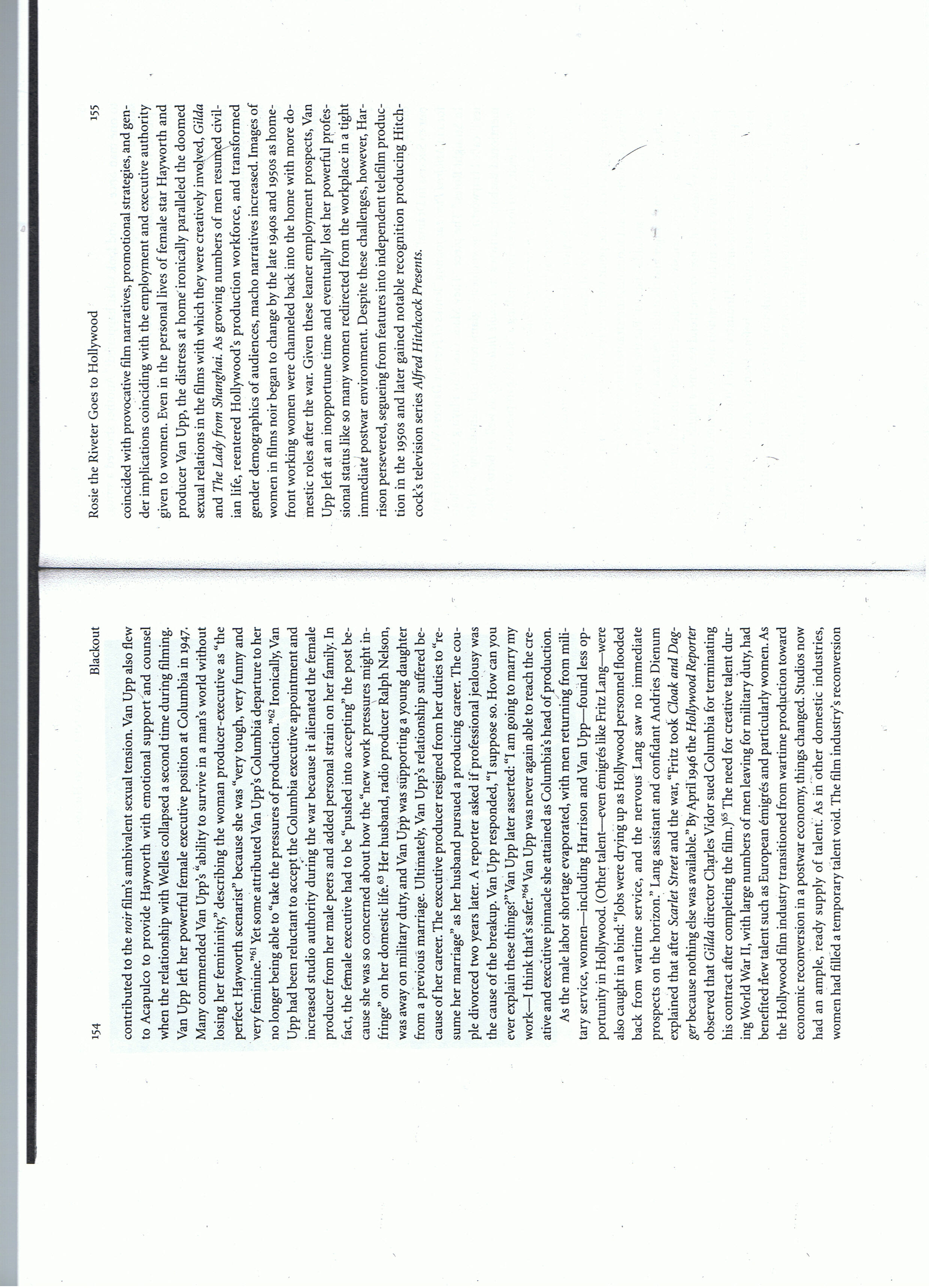censorship, (29)

154
Blackout
contributed to the noirfilms ambivalent sexual tension. Van Upp also flew to Acapulco to provide Hayworth with emotional support and counsel when the relationship with Welles collapsed a second time during filming. Van Upp left her powerful female executive position at Columbia in 1947. Many commended Van Upp’s “ability to survive in a mans world without losing her femininity,” describing the woman producer-executive as “the perfect Hayworth scenarist” because she was “very tough, very funny and very feminine.”61 Yet some attributed Van Upp’s Columbia departure to her no longer being able to “take the pressures of production.”62 Ironically, Van Upp had been reluctant to accept the Columbia executive appointment and increased studio authority during the war because it alienated the female producer from her małe peers and added personal strain on her family. In fact, the female executive had to be “pushed into accepting” the post because she was so concerned about how the “new work pressures might in-fringe” on her domestic life.63 Her husband, radio producer Ralph Nelson, was away on military duty, and Van Upp was siipporting a young daughter from a previouś marriage. Ultimately, Van Upp’s relationship suffered because of her career. The executive producer resigned from her duties to “resume her marriage” as her husband pursued a producing career. The cou-ple divorced two years later. A reporter asked if profesśional jealousy was the cause of the breakup. Van Upp responded, “I suppose so. How can you ever explain these things?” Van Upp later asserted: “I am going to marry my work—I think that’s safer.”64 Van Upp was never again able to reach the cre-ative and executive pinnacle she attained as Columbia’s head of production.
As the małe labor shortage evaporated, with men returning from military service, women—including Harrison and Van Upp—found less op-portunity in Hollywood. (Other talent—even emigres like Fritz Lang—were also caught in a bind: “Jobs were drying up as Hollywood personnel flooded back from wartime service, and the nervous Lang saw no immediate prospects on the horizon.” Lang assistant and confidant Andries Dienum explained that after Scarlet Street and the war, “Fritz took Cloak and Dag-ger because nothing else was available.” By April 1946 the Hollywood Reporter observed that Gilda director Charles Vidor sued Columbia for terminating his contract after completing the film.)65 The need for creative talent during World War II, with large numbers of men leaving for military duty, had benefited flew talent such as European ćmigres and particularly women. As the Hollywood film industry transitioned from wartime production toward economic reconversion in a postwar economy, things changed. Studios now had an ample, ready supply of talent. As in other domestic industries, women had filled a temporary talent void. The film industry’s reconversion
Rosie the Riveter Goes to Hollywood
155
coincided with provocative film narratives, promotional strategies, and gen-der implications coinciding with the employment and executive authority given to women. Even in the personal lives of female star Hayworth and producer Van Upp, the distress at home ironically paralleled the doomed sexual relations in the films with which they were creatively involved, Gilda and The Lady from Shanghai. As growing numbers of men resurhed civil-ian life, reentered Hollywood’s production workforce, and transformed gender demographics of audiences, macho narratives increased. Images of women in films noir began to change by the late 1940S and 1950S as home-front working women were channeled back into the home with morę domestic roles after the war. Given these leaner employment prospects, Van Upp left at an inopportune time and eventually lost her powerful profes-sional status Jike so many women redirected from the workplace in a tight immediate postwar environment. Despite these challenges, however, Har-rison persevered, segueing from features into independent telefilm production in the 1950S and later gained notable recognition producing Hitchcock^ television series Alfred Hitchcock Presents.
Wyszukiwarka
Podobne podstrony:
censorship, (19) 134 Blackout vorce, and the terms lousy, lousing, and brassiere. Songs and costu
censorship, (21) i38 Blackout out to be a lethal femme murderess who kills him (when he calls her
censorship, (25) 146 Blackout raveled during the making of the film, Van Upp had a close relation
censorship, (10) n6 Blackout ell with an open shirt, holding a cigarette, looms next to the capti
censorship, (12) 120 Blackout to drink” and caused Breen to issue a warning to Wilson regarding t
Introduction 3 The following factors were major contributors to the success of GSM: • &n
STRATEG IC PLANS TO ADDRESS CHALLENGES Increase Revenue Ali bcneficiaries contribute to the plan. Cu
Contributors to MySQL Although Oracle Corporation and/or its affiliates own all copyrights in the My
29 (277) THE PATTERN COLLECTION • 29 Fig. 6 Concealing ends To conceal the ends of a knot Hide the t
43 (173) THE PATTERN COLLECTION • 43 Diag. 29 KNOW-HOW 10 To make a twisted bar twist several ti
Contributions to the knowledge of Leucosiidae III. Umalana gen. nov. (Crustacea: Brachyura) B.S. Gal
DR. TELANG’S CONTRIBUTION TO SANSKRJT 207 also pointed out that it is morę plausible that ideas in t
PROF. H.D. VELANKAR’S CONTRIBUTION TO VEDłC STUDIES 229 conversant wilh the Ve<}2rigas including
REGULATIONS CONCERNING CONTRIBIJTIONS TO THE JOURNAL 1. Papers submitled for publicalion in thc Soci
shall pay their annual contributions to the International So-ciety. The amount and the datę of payme
więcej podobnych podstron